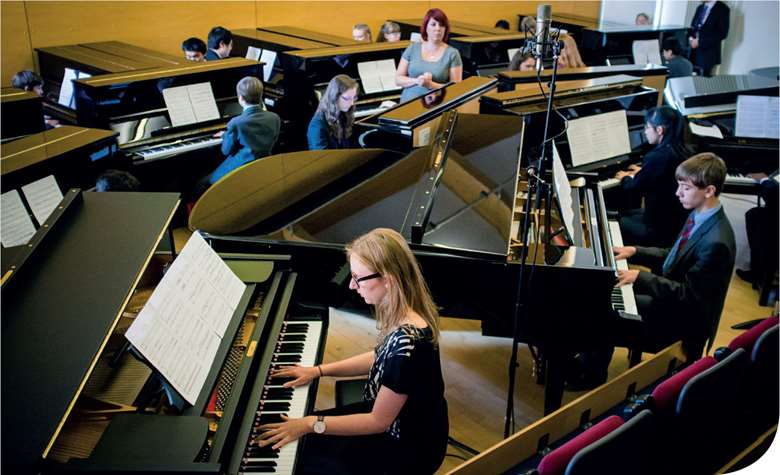ISM Column: State of the nation
Francesca Treadaway
Friday, March 1, 2019
On 4 February, the All-Party Parliamentary Group for Music Education, in partnership with the University of Sussex and ISM, released a new report entitled Music Education: State of the Nation which outlines the broad landscape of music education in England. Francesca Treadaway, the ISM's senior communications manager, tells us more

State of the Nation, authored by Alison Daubney (University of Sussex), Gary Spruce (Birmingham City University) and Deborah Annetts (ISM), with foreword from the MPs Diana Johnson and Andrew Percy, was borne out of a desire to identify the more pressing issues facing music education and to come up with possible solutions. This analysis draws together all available research, data and statistics into one comprehensive document for everyone to access and make use of in their own professional lives.
The Government claims that music education is fine and that the uptake of GCSE music is ‘broadly stable’. This report drills down into the detail, including the Department for Education's (DfE) own figures, and reveals that there are serious concerns.
It is agreed by all, including policy makers, that music education plays a special role in the lives of children. Over successive years, the Government has been engaged in numerous education initiatives from the Music Manifesto to the Henley Review, with the National Plan for Music Education and hubs coming out of the latter. What should have been a high point for music education was rapidly undermined by other government initiatives.
Key findings
- The EBacc is driving creative subjects from our schools. The current version of the EBacc has been in place since 2015 but only 38% of students in state-funded schools are entering it. This is against the Government's target figure of 75% by 2022 (90% by 2025). In 2017/2018 only 16.7% of students attained it, a fall of over 4% from 2016/2017. The EBacc policy is failing on its own terms yet at the same time it is having a disastrous impact on music education in our secondary schools.
- The DfE's own statistics show a fall of 17% in music GCSE (cohort adjusted) since 2014/2015 – this is not ‘broadly stable’.
- There is a similar picture within primary schools, where SATs are driving out creative subjects, including music.
- The DfE teacher workforce data shows that at KS3, there has been a music teacher workforce drop of 26.7%. The overall percentage of music teachers within the workforce declined at a greater rate than across the total workforce, while the overall percentage of those teaching EBacc subjects rose. This reflects the encroachment of the EBacc into KS3.
- The National Audit Office reported that in January 2018, 72% of secondary schools and 27% of primary schools were academies or free schools. Music is part of the national curriculum but it is not statutory in academies.
The report also assesses the latest proposals from Ofsted and raises concerns as to whether its current direction of travel will deliver the much-needed broad and balanced curriculum in our schools. The proposal to embed the EBacc in the inspection framework is particularly troubling. Geoff Barton, general secretary at Association of School and College Leaders says: ‘Unfortunately, the inspectorate's plan to judge a school's curriculum partly on how well it is preparing to achieve the government's “ambition” of 90% of pupils taking GCSEs in the EBacc suite of subjects is misconceived.’
The report should be read in the context of broader education policy as well as the specific contribution that music makes to cultural life, social and individual wellbeing and of course the major contribution that music makes to the economy. It is well known that music contributes £4.5bn gross value added to the economy each year. There are also approximately 150,000 full-time equivalent jobs in the music industry. We need an education system which can deliver what our children need to flourish in the fourth Industrial Revolution. We need an education system which embraces creativity and places it at its heart.
Top recommendations
- The Government must give clear guidance to schools that headline accountability measures must not erode the delivery of a broad and balanced curriculum at KS3. This must be delivered across all schools at all Key Stages, with music and the arts at its core.
- Music should be taught by a subject specialist teacher as part of the curriculum in all state schools for all pupils for at least one hour every week across KS3.
- The EBacc and Progress 8 accountability measures should be reviewed and reformed to provide a better education for children. At the very least, a sixth pillar should be added to the EBacc for the creative subjects, including music.
- The Government should encourage all schools to embed a culture of singing via classroom teaching.
- A new National Plan must provide clarity as to the roles and responsibilities of schools and Hubs relating to the delivery of a music education for all pupils.
- Ofsted should reconsider its proposal contained in Education inspection framework 2019: inspecting the substance of education in connection with its approach to the EBacc. We urge it to drop its proposal that inspectors understand what schools are doing to prepare for the EBacc to be achieved.

